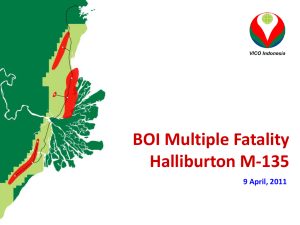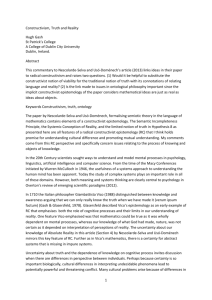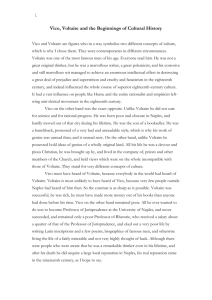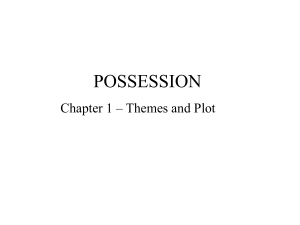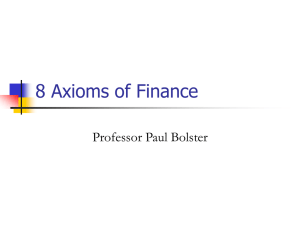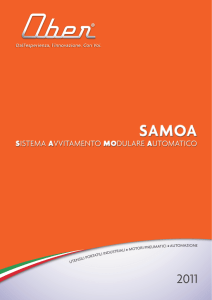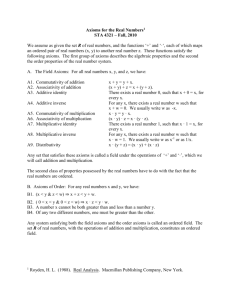Tateo (2014) vico document 1
advertisement
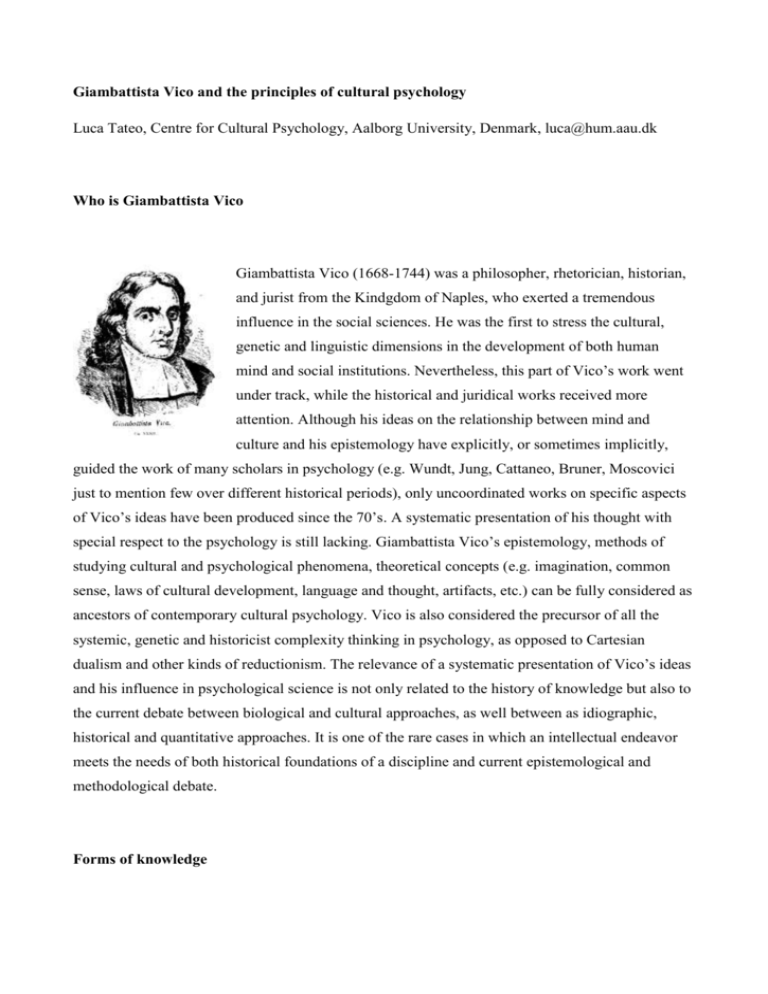
Giambattista Vico and the principles of cultural psychology Luca Tateo, Centre for Cultural Psychology, Aalborg University, Denmark, luca@hum.aau.dk Who is Giambattista Vico Giambattista Vico (1668-1744) was a philosopher, rhetorician, historian, and jurist from the Kindgdom of Naples, who exerted a tremendous influence in the social sciences. He was the first to stress the cultural, genetic and linguistic dimensions in the development of both human mind and social institutions. Nevertheless, this part of Vico’s work went under track, while the historical and juridical works received more attention. Although his ideas on the relationship between mind and culture and his epistemology have explicitly, or sometimes implicitly, guided the work of many scholars in psychology (e.g. Wundt, Jung, Cattaneo, Bruner, Moscovici just to mention few over different historical periods), only uncoordinated works on specific aspects of Vico’s ideas have been produced since the 70’s. A systematic presentation of his thought with special respect to the psychology is still lacking. Giambattista Vico’s epistemology, methods of studying cultural and psychological phenomena, theoretical concepts (e.g. imagination, common sense, laws of cultural development, language and thought, artifacts, etc.) can be fully considered as ancestors of contemporary cultural psychology. Vico is also considered the precursor of all the systemic, genetic and historicist complexity thinking in psychology, as opposed to Cartesian dualism and other kinds of reductionism. The relevance of a systematic presentation of Vico’s ideas and his influence in psychological science is not only related to the history of knowledge but also to the current debate between biological and cultural approaches, as well between as idiographic, historical and quantitative approaches. It is one of the rare cases in which an intellectual endeavor meets the needs of both historical foundations of a discipline and current epistemological and methodological debate. Forms of knowledge In Greek philosophy, as it was inherited by western culture, there were hierarchies in the different forms of knowledge in relation to experience and to interpersonal, as we would say today, or shared knowledge. For Plato there are two basic modes of knowledge: episteme and doxa. They can be approximately translated as truth or true knowledge, and belief or justified belief the latter. Plato’s idea is that the kind of every day statement we make is inherently deficient with respect to real truth. We deal with world according to what we desire, what we need, what other people think, etc. This is a language and experience-based mode of thought, a knowing about the particular, the individual, the sensible things, we could say idiographic, that always lead us to false generalizations about the universals, that Plato blame to Sophists. Thus, Doxa, is weak cognitive attitude based on our need to respond quickly and practically to every day matters. On the other hand, there is the true knowledge, which is instead the logic and mathematic-based mode of thought and it is about the universals and abstract ideas. When episteme replaces doxa, that includes both opinions or justified true beliefs, then we enter the realm of philosophy. At the beginning of Metaphysics, Aristotle develops Plato’s epistemology in three different types of knowledge: knowledge from experience, knowledge from art, and knowledge from science. Knowledge from experience is achieved learning how to perform a certain task or to solve a certain problem by having tried different methods on one’s own. This is the lay people’s knowledge. It is not a knowledge about how things work, but just about how they do. When experiences in a certain subject matter are put together, knowledge of an “art” or “trade” emerges. Now, is not just knowledge about how to accomplish a task, but also a first type of knowledge know about the reasons behind it. This is the doctor’s or craftsman’s knowledge. The third degree of knowledge, “scientific” or “theoretical” knowledge, is according to Aristotle that of sciences, philosophy, and mathematics. As Aristotle says: "With a view to action experience seems in no respect inferior to art, and we even see men of experience succeeding more than those who have theory without experience. The reason is that experience is knowledge of individuals, art of universals, and actions and productions are all concerned with the individual; for the physician does not cure a man, except in an incidental way, but Callias or Socrates or some other called by such an individual name, who happens to be a man. If, then, a man has theory without experience, and knows the universal but does not know the individual included in this, he will often fail to cure; for it is the individual that is to be cured. But yet we think that knowledge and understanding belong to art rather than to experience, and we suppose artists to be wiser than men of experience and this because the former know the cause, but the latter do not." (Metaphysics) Aristotle’s distinction has thus to do with process and cause. The practical knowledge is about the process, the making and the achievement of a goal. In this respect, it can be based on doxa, which is indeed the domain of working justified beliefs. It is somehow based on a good-working truth, which is commonly confirmed by others agreement and by successful experience. But episteme is about causes, and namely first causes, or real essence of things. In this respect, true knowledge must go beyond phenomena, everyday language and common sense. It must be somehow formalized, mathematized and follow logic rather than practical rules. This is the theoretical framework for the separation, until Galileo comes out, between the realm of experience and the realm of abstract speculation, that of physical and that of non-physical. In the famous incipit of the “Discourses and mathematical demonstrations on two new sciences concerning mechanics and local motions”, Galileo wipes away the dualism between episteme and techne, opening a new way to look at scientific work: “A large field for philosophical investigation is open to speculative minds by frequenting your famous arsenal, Venetian Gentlemen, and particularly in that branch which is called mechanics, since every sort of instrument is continually put into operation there by a great number of artisans: amongst them there must be some who, through observations handed down by their predecessors as well as through those which they attentively and continually make for themselves, are very expert and capable of the most subtle reasoning” (VIII, 49). The social, historic and economic conditions were changed. The technical and practical work was definitely understood as the engine of economic and trade development. No reason then for continuing to disdain technical knowledge, formerly ascribed to lower classes, with respect to abstract philosophical speculation that was apanage of higher and educated classes, namely philosophers. The way was paved to modern techno-scientific mode of thought and natural philosophy. The geometric method in human sciences While Galileo reconciled the realm of experience with the realm of mathematic and deductive reasoning in the field of physical science, the whole range of culture, language and mind phenomena was still in trouble. “The mind/body problem can be stated as the simple question: How can a non-physical mind or soul interact in a causal way with a physical body? The problem is deceptively simplistic sounding. Rest assured that it is not a simple problem, and there are several hundred years of metaphysics to back this statement up. In fact, modern metaphysics, which begins with Descartes, can be well interpreted as being centrally focused on the mind/body problem, just as Ancient Greek metaphysics was focused on the problem of universals” (Davis, 2010, p. ). Descartes (1596-1650) solution was to preserve the realm of mind by developing a logic-based coherent system in which knowledge is private and the individual critical sense awareness is the only way to attain the truth, starting form experimental induction (De Santillana, 1950; Tristam, 1988). “Descartes despises fantasy and what comes to us through the senses, he discards history and tradition as a mass of popular nugacity, and believes only in the clear cold sense of the ‘honnete homme’. He builds up nature mechanically, society atomistically. That is inevitable, since he is a mechanical abstractor, a mathematical machine producing only its own symbols. Deduction is an empty game when it is not preceded by the amplest of inductions, covering all of our experience which starts with "fantasy "-an induction such as Descartes tyrannical precepts forbid” (de Santillana, 1950, p.569). When Descartes view became mainstream, all human products such as arts, myths, rhetoric, and all has to with social and practical social life in general, that could not be referred to the domain of technology, to the extent that they could not be understood and represented in terms of the only rigorous method of knowledge: mathematic. Thus, Cartesianism rejected all the forms of knowledge related to the use of language, such as rethoric, as mere forms of presentation, of orientation of beliefs. This led to a change in the way of reckoning education that at Vico’s time was largely based on Cartesianism and Port-Royal logic. Students must learn “critica” (that is a way of reasoning clear and certain based on mathematical and logical knowledge) instead of “topica” (that is all the subjects related to rhetoric). The historical conflict between civic humanism and natural philosophy irreducible epistemologies that with Cartesianism is established in modern philosophy is still at work today. I see the echoes of this dualism in the contemporary segmentation of psychological sciences. In this sense, as we will see, Cultural Psychology can be considered an heir of Vico’s philosophy to the extent that the cultural products of human activity are put in relation with the mind. In Cartesianism, instead, mind was rather a closed system, basically working on its own principles, receiving inputs from the senses induction. I see an epistemological analogy with those approaches, such as cognitivism and neuro-psychology, that treat brain as a closed system working with its own principles, that treat social and cultural dimensions as inputs and outputs. Develping Bacon’s ideas, Vico tried instead to develop a whole philosophical system in which mind and culture are put in a co-costitutive relationship. Bacon was a thirty year senior than Descartes. Even if later in 17th Century his position became somehow minority with respect to Cartesian mainstream, he attempted to develop a systematic epistemological and methodological system able to account also for the products of human civil activity. “To be able to demonstrate knowledge of causes requires having undertaken an active initiative investigation of them. As the famous third aphorism of the New Organon puts it, "Human knowledge and human power meet in one.... that which in contemplation is as the cause is in operation as the rule." Bacon affirms the "position that 'true knowledge is knowledge by causes,"' and asserts that the important causes are not the immediate efficient and material causes, but what he misleadingly calls "formal causes" or "forms": "For though in nature nothing really exists besides individual bodies, performing pure individual acts according to a fixed law, yet in philosophy this very law, and the investigation, discovery, and explanation of it, is the foundation as well of knowledge as of operation. And it is this law with its clauses that I mean when I speak of forms." Interpretation of Bacon has suffered from general ignorance, or ignoring, of the rational element of his logic of science grounded in operatio” (Barnouw, 1980, p. 611). Bacon aimed at developing an epistemological system that was able to deal with different kinds of phenomena, independently from their ontological status, whether they were physical or nonphysical. His system was organized on the model of a geometric method: that is a system that starting form observation should build some axioms from which it would possible to derive consequences able to account for the phenomena in return. This is was the only way to relate deduction and induction in whole “forms” that put together causes and effects, axioms and empirical facts. From Bacon’s system, Vico draw some basic ideas. The first one was the objective of building an epistemological system “more geometrico” (on a geometric way) that was made for studying the product of human social activity, culture and history. The second point was the “adaptation of the ancients' correlation of topica with invention as a preliminary to judgment (critica) was taken over by Vico, who suggested that topical (positive, given) and critical (rational, truth-oriented) were interrelated elements within every branch of science” (Barnouw, 1980, p. 611). The third idea was the relationship between knowing and making. For Bacon, to attain knowledge implies mastering reality. Knowledge is a form of power on reality because it is related to the capability of humans to make things. This implies that knowledge and human reality are in a cycle of continuous creation and re-creation, as long as we make, we know, by knowing we make different things, and so on and so forth. Thus, there is no ultimate knowledge, but development of knowledge. But development of knowledge can be achieved only through the correct method and epistemology. Verum and certum Giambattista Vico was an academic outsider. He succeeded in achieving an academic professorship in “Eloquence” at the University of Naples in 1699. He sought for a professorship in law. Because the mainstream was dominated by Cartesianism, and his ideas were conflicting with it, he spent the whole life trying to get an official recognition for his innovative ideas, but his work was almost ignored when he was alive. He was asked to give seven times the inaugural speech in Latin of the academic year at the University of Naples. In his seventh speech, published in 1708 with the title “De nostri temporibus studiorum ratione” (On the method of education of our times) (Vico, 1965), Vico starts to outline his theory of the specificity of human sciences, polemizing with Cartesianism-based education. The two main claims of Vico in this work are that human thought is based on several dimensions, not just on logical and rational thought. This implies that an education which is only aimed at developing the “critica”, in Descartes sense of analysis, will grow students that are not able to play an active and constructive role and lead in civil society. “In De nostri temporis studiorum ratione Vico compares the methodological orientations of the classical and the modern intellectual world, explicitly extending and modifying Bacon's survey. He is particularly concerned to see what advantages of the ancients' system of arts and sciences might have been sacrificed in the progress of modern science, and whether these might be recovered or compensated for without detriment to the modern critica” (Barnouw, 1980, p. 614). I think it is very important to look at Vico’s criticism to Descartes, that will become positive statements in the New Science, because his arguments are in some sense applicable also to the contemporary epistemological debate in psychology. The first point in “De nostri temporis” is the interdependence of empirical and rational. The theoretical and practical dimensions of knowledge are always related. In this sense, geometry is an example of fully developed science to the extent that geometrical method has been applied to physics, but also because it is a product of human activity. Knowledge is made of understanding things as they came to be as they are at present. As human cognition is limited in his capability to know the real world, only God has the full understanding of phenomena and their causes, as He made them and knows the whole history. “But this contrast also implies a parallel. God knows (cognoscit) because he creates and disposes; man knows (novit) because he makes and composes. The active component of human knowing is the key to man's participation in the divine form of cognition, intelligere” (Barnouw, 1980, p. 616). As Vico says in his famous passage: “We demonstrate geometry because we make it; if we could demonstrate physics, we would make it” (Vico, 1965). Opposing Descartes, Vico claims that we can’t know our mind only by observing from “within” the system logic, because God made it not us. We can know mind only in relationship to its products. This is the second point: every product of human activity is worth to be object of science. We can study culture because we made it and we can genetically reconstruct the whole process of creation and development. In this sense, the knowledge of ancient cultures are relevant because they hold a relationship of continuity and discontinuity with the current ideas. Through the study of the past, we can understand the genesis and development of the present. The third point is that the origin of culture is exactly the solution human beings found to overcome their cognitive finitude: “since man is not capable of grasping the natural elements from which things derive their reality, he creates for himself the elements of words, from which ideas are called forth without controversy” (Barnouw, 1980, p. 617). Thus, culture is nothing but the “cultural” solution lay people developed to account for natural phenomena they can’t understand from their causes. This wide range of solution is made possible not by the “cogito”, which is a self-evident but tautological process, but is made possible by the human capability of anticipating and innovating through imagination. At this point, Vico outlined all the basic elements of his philosophical system that he will fully develop in the 3 editions of the “New Science”: There are different kinds of truth: a) the “Truth” (verum), which only pertains to God; b) the “common sense” (verum certum) which is the practical knowledge and belief achieved through practices and consent; and c) the “truth through making” (verum factum), which is the scientific knowledge about all the products of human activity. Vico’s axioms in the New Science The previous pretty long discussion was required to understand the path that led Vico to the elaboration of his innovative philosophical system presented in his master work “New Science”. He aimed at developing an epistemological and methodological framework that could serve to the study of the products of human culture and to the understanding of human mind. In this sense, Vico can be considered the ancestor of cultural psychology. As I will try to demonstrate, the ideas he elaborated are strictly related to the epistemological principles of cultural psychology. Vico aimed at developing a systematic framework for the study of human activity and human mind according to the criteria of science he outlined in “De nostri temporis”. Such a a system must be first of all “geometrical”, that is a system made of axioms that generate deductively a set of rules to be applied to the study of phenomena. It must be able to account for the whole history of human development as well as to the full range of human products, arts, law, customs, language, institutions, etc. This scientific enterprise is possible because the object of the “new science” is made by the humans themselves. “Now, as geometry, when it constructs the world of quantity out of its elements, or contemplates that world, is creating it for itself, just so does our Science, but with a reality greater by just so much as the institutions having to do with human affairs are more real than points, lines, surfaces, and figures are”. (Vico, 1948, pp. 104-105). I will not discuss the whole book, which is an extended theory of human historic development and of its products, very similar to the endeavor of Wundt’s Völkerpsychologie (who was influenced by Vico’s ideas). I will focus on the system of axioms (called “Degnità”) that Vico develops as starting points of the new system. I will argue that these theoretical principles represent the first systematic formulation of the ideas that will be later developed by cultural psychology. Vico elaborates 114 axioms derived from the discussions of the development of ancient cultures, that he will use in return to analyse the whole chronology of civilization. “Axioms are the 'ties that bind' human things into a history, a pattern of providence and human making that one can address eloquently – that is, comprehensively – as a whole […] Axioms, like the loci of the ancient memory systems, remind us of things we should know in narrating an eloquent whole […] In this way the axioms become pisteis, means of persuasion, by which we come to understand the realities of our situation” (Goetsch, 1995,p. 127) In the “Degnità”, Vico indeed elaborates the basic principles of the mind-culture relationship. I will discuss some of the most relevant axioms as specimen of Vico’s system. The axioms I opens with: “Because of the indefinite nature of the human mind, wherever it is lost in ignorance, man makes himself the measure of all things” (Vico, 1948, p. 54). It is stated that human knowledge is primarily anthropomorphic. What is unknown and far from direct experience also requires to be explained by larger causes. It is the basis for the development of mythology, in which the causes of natural phenomena that didn’t have a direct explanation were attributed to anthropomorphic figures with immense powers. Axiom II is: “It is another property of the human mind that whenever men can form no idea of distant and unknown things, they judge them by what is familiar and at hand” (Vico, 1948, p. 54). We could define this as the principle of “anchoring” and “objectivation” as understood by Moscovici. As the symbolic resources for explanation and imagery are provided by culture, this axiom can be also considered as the idea of inertia in cultural innovation. Axioms III and IV deal with cultural continuity. “Every nation, according to him, whether Greek or barbarian, has had the same conceit that it before all other nations invented the comforts of human life and that its remembered history goes back to the very beginning of the world”. And “To this conceit of the nations there may be added that of the scholars, who will have it that whatever they know is as old as the world” (Vico, 1948, p. 55). Culture looks backward in order to explain and plan. The sense of cultural continuity is essentially related to past. Axioms 7 and 8 are about the relationship between nature and civilization. “Legislation considers man as he is in order to turn him to good uses in human society. Out of ferocity, avarice and ambition, the three vices which run throughout the human race, it creates the military, merchant and governing classes, and thus the strength, riches and wisdom of commonwealths. Out of these three great vices, which could certainly destroy all mankind on the face of the earth, it makes civil happiness”. And “Things do not settle or endure out of their natural order (…) This same axiom, together with the seventh and its corollary, proves that man has free choice, however weak, to make virtues of his passions” (Vico, 1948, p. 56). Vico seems to share the idea that civilization is a way to overcome the limits of human nature. At the same time, it marks the shift of human beings when developing culture. In Vico’s view, civilization is in fact the human invention to solve the problem of survival and to provide answers to unknown problems. Axiom 9 says: Men who do not know the truth of things try to reach certainty about them, so that, if they cannot satisfy their intellects by science, their wills at least may rest on conscience” (Vico, 1948, p. 56). Here is outlined the idea of common sense knowledge or “certum”. There is a scientific knowledge qualitatively different from beliefs or values. The first requires a scientific method to be ascertained, the latter is based on consensual and ethical relationships. In axiom 10, Vico defines the domains of knowledge with respect to verum and certum. “Philosophy contemplates reason, whence comes knowledge of the true; philology observes the authority of human choice, whence comes consciousness of the certain. This axiom by its second part defines as philologians all the grammarians, historians, critics, who have occupied themselves with the study of the languages and deeds of peoples: both their domestic affairs, such as customs and laws, and their external affairs, such as wars, peaces, alliances, travels and commerce. This same axiom shows how the philosophers failed by half in not giving certainty to their reasonings by appeal to the authority of the philologians, and likewise how the latter failed by half in not taking care to give their authority the sanction of truth by appeal to the reasoning of the philosophers. If they had both done this they would have been more useful to their commonwealths and they would have anticipated us in conceiving this Science” (Vico, 1948, pp. 56-57). This axiom is extremely relevant, to the extent that as soon as the different domains of knowledge have been defined, it is stated that they are complementary. This is a basic epistemological stance in cultural psychology, stressing the importance of the complementarity between experimental and genetic approaches. The combination of axioms 11, 12 and 13, outlines the fundamental idea of common sense. “Human choice, by its nature most uncertain, is made certain and determined by the common sense of men with respect to human needs or utilities, which are the two origins of the natural law of nations” (Vico, 1948, p. 57). “Common sense is judgment without reflection, shared by an entire class, an entire people, an entire nation, or the whole human race” (Vico, 1948, p. 57). And Uniform ideas originating among entire peoples unknown to each other must have a common ground of truth. 145 This axiom is a great principle which establishes the common sense of the human race as the criterion taught to the nations by divine providence to define what is certain in the natural law of nations” (Vico, 1948, p. 57). In these statements, Vico provides a definition of a mode of thought which is based on the anticipation of judgment, on the consensual validation and the existence of “cultural constants” (Rogoff, 2003). What is relevant for cultural psychology is that for the first time in history, common sense knowledge is not understood as a lower way of cognition, as a cognitive bias, but as specific mode of thought which has his own rules and usefulness in social life. In axioms 14 and 15, Vico introduces the fundamental principle of the historical and genetic method. I am maybe reading too much into the text by using these terms that belong to a modern way of thinking. I do that to stress the anticipatory character of Vico’s sytem, which has indeed influenced the development of human sciences. Axiom 14 is: “The nature of things is nothing but their coming into being (nascimento) at certain times and in certain fashions. Whenever the time and fashion is thus and so, such and not otherwise are the things that come into being” (Vico, 1948, p. 58). Axiom 15 instead is: “The inseparable properties of things must be due to the mode or fashion in which they are born. By these properties we may therefore tell that the nature or birth (natura o nascimento) was thus and not otherwise” (Vico, 1948, p. 58). To understand phenomena is thus necessary to investigate both the historical conditions of their origin and the genetic process of their development. I would like to stress is about the relationship between language culture and mind. In axioms 16, 17 and 18, Vico states that processes are crystallized in language, which is the vehicle of cultural continuity. It is also the primary object of investigation for an historical and developmental science of civilization. “Vulgar traditions must have had public grounds of truth, by virtue of which they came into being and were preserved by entire peoples over long periods of time. It will be another great labor of this Science to recover these grounds of truth which, in the passage of years and the changes in languages and customs, has come down to us enveloped in falsehood” (Vico, 1948, p. 58). Axiom 17 is “The vulgar tongues should be the most weighty witnesses concerning those ancient customs of the peoples that were observed at the time when the languages were being formed” (Vico, 1948, p. 58). And “A language of an ancient nation, which has maintained itself as the dominant tongue throughout its development, should be a great witness to the customs of the early days of the world ” (Vico, 1948, p. 58). These axioms are an early formulation of linguistic relativism. When Vico speaks about philology, he had in mind a different discipline than the contemporary one. It is in fact one of the precursors of philology, sociolinguistic and psycholinguistic as they started to develop during Romanticism. Unfortunately, at his time Vico didn’t have the methodological tools to develop his idea of philology as the method for the new science. In fact, his works are full of wrong and imaginary etymologies from which he draws historical conclusions. The last relevant point is the relationship between culture and the different dimensions of mental activity. The famous axiom 53 states: “Men at first feel without observing, then they observe with a troubled and agitated spirit, finally they reflect with a clear mind. This axiom is the principle of the poetic sentences, which are formed with senses of passions and affections, in contrast with philosophic sentences, which are formed by reflection and reasoning. The more the latter rise toward universals, the closer they approach the truth; the more the former take hold of particulars, the more certain they become” (Vico, 1948, pp. 67-68). We can read the former axiom in combination with the 63, “The human mind is naturally inclined by the senses to see itself externally in the body, and only with great difficulty does it come to attend to itself by means of reflection. This axiom gives us the universal principle of etymology in all languages: words are carried over from bodies and from the properties of bodies to express the things of the mind and spirit” (Vico, 1948, p. 70). Here is outlined the complex relationships between body, affects, mind and culture in Vico’s psychology. First of all, knowledge originates from embodiment and affection. Not only in the sense that sensual experiences are the first sources of data for elaborating knowledge. Also in the sense that we know first through our body and our emotions and that body is the first tool for communication. Verbal language and thought originates from bodily language, an idea that will be developed centuries later for instance by Mead’s language of gestures. Secondly, there is a vertical relationship between particular experiences and abstract concepts. In fact, if the latter are elaborated from the former, they go back to particular experiences by modifying reality, as Vico’s conception of knowledge was related to action on things, following Bacon. I won’t go on discussing the whole system of axioms, as my purpose was to illustrate some examples of the innovation that Vico brought to human sciences and some of his ideas that can be considered as precursors of cultural psychology. I will now try to draw some reflections about the lesson learnt as cultural psychologist from Vico’s readings. Genetical, generative and generated Giambattista Vico was the first philosopher that systematically explored the relationship between mind and culture. There are several aspects of his complex theoretical framework that I have not discussed here, such as the organization of mind and its faculties –fantasia, ingegno and memoria-, the problem of time, or the relationship with British empiricism. From the philosophical point of view, Vico was a kind of boundary thinker, at the crossroad between humanism, empiricism and Enlightment. What makes Vico’s thought so relevant for contemporary cultural psychology is the fact that he formulated at the beginning of 18th Century an idea of a science of human activity able to understand the way mind deals with reality in the context of human activity and the mediation of linguistic and material artifacts. This legacy has been hardly recognized, even if scholars like Wundt, Bruner, Cole, and Moscovici, just to mention but few, sometimes refer to it. I think that Vico’s framework has 3 relevant epistemological dimensions that must be always orienting psychological research: genetical, generative and generated. The genetical dimension is not only related to the historical and concrete conditions in which psychological processes take place, but also to the consideration of the whole form its genesis to his transformation in something different. This is the generative dimension, that is the fact that experiencing is always changing, to the extent that the relationship between mind and culture, or mind and reality if you one is a realist!, is always co-generative. The cognition, affection and action are always linked into a whole, that is an act upon the situation. Generated, instead, means that once an experience occurs in irreversible time it can never be deleted, something new has been created. Still to be developed… I made big mistakes in interpreting philosophers? Does it makes sense in general? What suggestions? References Bacon, F. Novum Organum. In The Works of Francis Bacon, Vol. IV, ed. J. Spedding, R. L. Ellis, and D. D. Heath (London, 1857- 1859) Barnouw, J. (1980). Vico and the Continuity of Science: The Relation of His Epistemology to Bacon and Hobbes. Isis, Vol. 71, No. 4 (Dec., 1980), pp. 609-620 Davis, J. C. (2010). Metaphysics and the Meaning of Life. Goetsch, J. R. (1995). Vico’s Axioms. The Geometry of the Human World. New Heaven and London: Yale University Press. de Santillana, G. (1950). Vico and Descartes. Osiris, Vol. 9 (1950), pp. 565-580 Rogoff, B. (2003). The Cultural Nature of Human Development. Cambridge, MA: Oxford University Press Schaeffer, John D. Sensus Communis : Vico, Rhetoric, and the Limits of Relativism. Durham: Duke University Press, 1990. Tateo, L. (2013). Generalization as creative and reflective act: Revisiting Lewin's conflict between Aristotelian and Galileian modes of thought in psychology. Theory Psychology, Jun 2013; Tristram, R. J. (1988). Vico on the Production and Assessment of Knowledge. Philosophy and Phenomenological Research, Vol. 48, No. 3 (Mar., 1988), pp. 355-388. Vico, G. (1965). On the Study Methods of Our Time. Trans E. Gianturco. Indianapolis: BobbsMerrill. Vico, G. (1948). The New Science of Giambattista Vico. Trans. T. Goddard Bergin and M. H. Fisch. Ithaca: Cornell UP.
